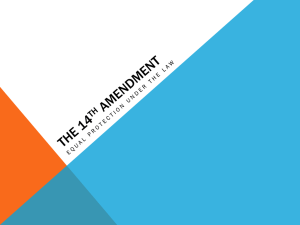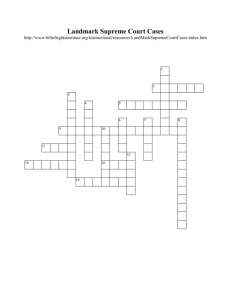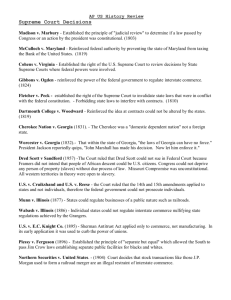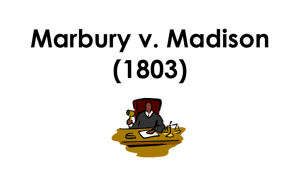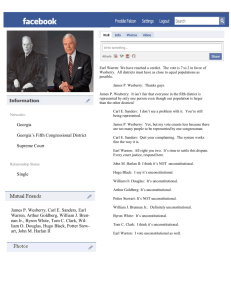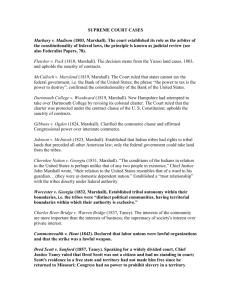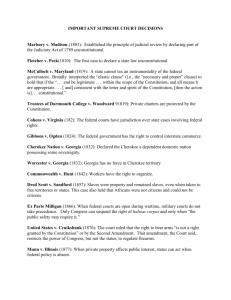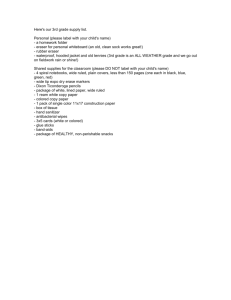word document - Blake Unger Dvorchik
advertisement
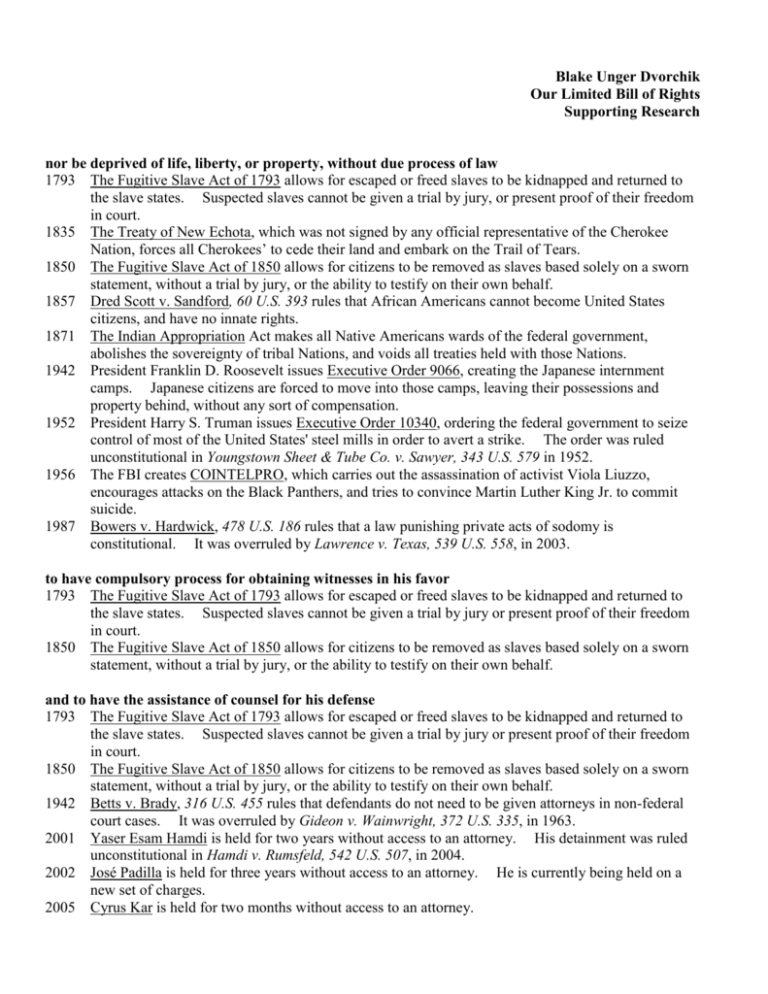
Blake Unger Dvorchik Our Limited Bill of Rights Supporting Research nor be deprived of life, liberty, or property, without due process of law 1793 The Fugitive Slave Act of 1793 allows for escaped or freed slaves to be kidnapped and returned to the slave states. Suspected slaves cannot be given a trial by jury, or present proof of their freedom in court. 1835 The Treaty of New Echota, which was not signed by any official representative of the Cherokee Nation, forces all Cherokees’ to cede their land and embark on the Trail of Tears. 1850 The Fugitive Slave Act of 1850 allows for citizens to be removed as slaves based solely on a sworn statement, without a trial by jury, or the ability to testify on their own behalf. 1857 Dred Scott v. Sandford, 60 U.S. 393 rules that African Americans cannot become United States citizens, and have no innate rights. 1871 The Indian Appropriation Act makes all Native Americans wards of the federal government, abolishes the sovereignty of tribal Nations, and voids all treaties held with those Nations. 1942 President Franklin D. Roosevelt issues Executive Order 9066, creating the Japanese internment camps. Japanese citizens are forced to move into those camps, leaving their possessions and property behind, without any sort of compensation. 1952 President Harry S. Truman issues Executive Order 10340, ordering the federal government to seize control of most of the United States' steel mills in order to avert a strike. The order was ruled unconstitutional in Youngstown Sheet & Tube Co. v. Sawyer, 343 U.S. 579 in 1952. 1956 The FBI creates COINTELPRO, which carries out the assassination of activist Viola Liuzzo, encourages attacks on the Black Panthers, and tries to convince Martin Luther King Jr. to commit suicide. 1987 Bowers v. Hardwick, 478 U.S. 186 rules that a law punishing private acts of sodomy is constitutional. It was overruled by Lawrence v. Texas, 539 U.S. 558, in 2003. to have compulsory process for obtaining witnesses in his favor 1793 The Fugitive Slave Act of 1793 allows for escaped or freed slaves to be kidnapped and returned to the slave states. Suspected slaves cannot be given a trial by jury or present proof of their freedom in court. 1850 The Fugitive Slave Act of 1850 allows for citizens to be removed as slaves based solely on a sworn statement, without a trial by jury, or the ability to testify on their own behalf. and to have the assistance of counsel for his defense 1793 The Fugitive Slave Act of 1793 allows for escaped or freed slaves to be kidnapped and returned to the slave states. Suspected slaves cannot be given a trial by jury or present proof of their freedom in court. 1850 The Fugitive Slave Act of 1850 allows for citizens to be removed as slaves based solely on a sworn statement, without a trial by jury, or the ability to testify on their own behalf. 1942 Betts v. Brady, 316 U.S. 455 rules that defendants do not need to be given attorneys in non-federal court cases. It was overruled by Gideon v. Wainwright, 372 U.S. 335, in 1963. 2001 Yaser Esam Hamdi is held for two years without access to an attorney. His detainment was ruled unconstitutional in Hamdi v. Rumsfeld, 542 U.S. 507, in 2004. 2002 José Padilla is held for three years without access to an attorney. He is currently being held on a new set of charges. 2005 Cyrus Kar is held for two months without access to an attorney. the right of trial by jury shall be preserved 1793 The Fugitive Slave Act of 1793 allows for escaped or freed slaves to be kidnapped and returned to the slave states. Suspected slaves cannot be given a trial by jury, or present proof of their freedom in court. 1850 The Fugitive Slave Act of 1850 allows for citizens to be removed as slaves based solely on a sworn statement, without a trial by jury, or the ability to testify on their own behalf. 1862 President Abraham Lincoln issues a September 24, 1862 Proclamation suspending habeas corpus, and 13,000 people are arrested under martial law. The suspects’ subsequent trials by military tribunal were ruled unconstitutional in Ex parte Milligan, 71 U.S. 2 in 1866. 2001 President George W. Bush issues a November 13, 2001 Presidential Military Order, establishing military commissions to try enemy combatants. The order was ruled unconstitutional in Hamdan v. Rumsfeld, 548 U.S. ___ (also 126 S.Ct. 2749) in 2006. 2002 The Department of Defense issues Military Commission Order No. 1, implementing the November 13, 2001 Presidential Military Order. It was ruled unconstitutional in Hamdan v. Rumsfeld, 548 U.S. ___ (also 126 S.Ct. 2749) in 2006. or abridging the freedom of speech 1798 The Sedition Act makes it illegal to compose any "false, scandalous, and malicious writing" against any part of the federal government. 1862 President Lincoln's Secretary of War, Edwin Stanton, issues an August 8, 1862 War Department Order to "arrest and imprison any person or persons who may be engaged, by act, speech or writing, in discouraging volunteer enlistments, or in any way giving aid and comfort to the enemy, or in any other disloyal practice against the United States." 1873 The Comstock Act makes it illegal to send any "obscene, lewd, and/or lascivious" material, including contraceptives, through the mail. 1917 The Espionage Act of 1917 makes it illegal to hinder the armed forces in any way, including discouraging recruitment. 1918 The Sedition Act of 1918 makes it illegal to utter or print any "disloyal, profane, scurrilous, or abusive language" against the federal government, the flag, or the armed forces. 1919 Schenck v. United States, 249 US 47 convicts Schenck of obstructing recruitment under the Espionage Act of 1917. Debs v. United States, 249 U.S. 211 convicts Debs of obstructing recruitment under the Espionage Act of 1917. Abrams v. United States, 250 U.S. 616 convicts four people of advocating a worker strike under the Sedition Act of 1918. 1925 Gitlow v. New York, 268 U.S. 652 convicts Gitlow of advocating the overthrow of the government. 1927 Whitney v. California, 274 U.S. 357 convicts Whitney of advocating the overthrow of the government. 1940 The Alien Registration Act of 1940 (also known as the Smith Act) makes it illegal to "advocate, abet, advise, or teach the duty, necessity, desirability, or propriety of overthrowing or destroying any government in the United States by force or violence." 1951 Dennis v. United States, 341 U.S. 494 convicts eleven people, including Dennis, the general secretary of the Communist Party, of teaching and advocating the overthrow of the government under the Alien Registration Act of 1940. 1989 The Flag Protection Act makes it illegal to deface the United States flag. It was ruled unconstitutional in United States v. Eichman, 496 U.S. 310, in 1990. 1996 The Communications Decency Act prohibits indecent speech and material on the Internet. That section was ruled unconstitutional in Reno v. American Civil Liberties Union, 521 U.S. 844, in 1997. or [freedom] of the press 1798 The Sedition Act makes it illegal to publish any "false, scandalous, and malicious writing" against any part of the federal government. 1862 President Lincoln's Secretary of War, Edwin Stanton, issues an August 8, 1862 War Department Order to "arrest and imprison any person or persons who may be engaged, by act, speech or writing, in discouraging volunteer enlistments, or in any way giving aid and comfort to the enemy, or in any other disloyal practice against the United States." 1864 President Abraham Lincoln issues a May 18th, 1864 Executive Order closing the New York Journal of Commerce and the New York World, and authorizing the arrest of their editors. 1873 The Comstock Act makes it illegal to send any "obscene, lewd, and/or lascivious" material, including contraceptives, through the mail. 1917 The Espionage Act of 1917 makes it illegal to hinder the armed forces in any way, including discouraging recruitment. 1918 The Sedition Act of 1918 makes it illegal to utter or print any "disloyal, profane, scurrilous, or abusive language" against the federal government, the flag, or the armed forces. 1919 Schenck v. United States, 249 US 47 convicts Schenck of obstructing recruitment under the Espionage Act of 1917. Frohwerk v. United States, 249 US 204 convicts Frohwerk of preparing and publishing anti-draft articles under the Espionage Act of 1917. Abrams v. United States, 250 U.S. 616 convicts four people of advocating a worker strike under the Sedition Act of 1918. 1940 The Alien Registration Act of 1940 (also known as the Smith Act) makes it illegal "to print, publish, edit, issue, circulate, sell, distribute, or publicly display any written or printed matter advocating, advising, or teaching the duty, necessity, desirability, or propriety of overthrowing or destroying any government in the United States by force or violence." 1951 Dennis v. United States, 341 U.S. 494 convicts eleven people, including Dennis, the general secretary of the Communist Party, of teaching and advocating the overthrow of the government under the Alien Registration Act of 1940. and to petition the government for a redress of grievances 1835 The House of Representatives adopts a series of Gag Rules, barring all bar abolitionist petitions. The Gag Rules finally expired in 1844. nor shall private property be taken for public use, without just compensation 1835 The Treaty of New Echota, which was not signed by any official representative of the Cherokee Nation, forces all Cherokees’ to cede their land and embark on the Trail of Tears. Their land was then sold off by the government. 1942 President Franklin D. Roosevelt issues Executive Order 9066, creating the Japanese internment camps. Japanese citizens are forced to move into those camps, leaving their possessions and property behind, without any sort of compensation. 1944 Korematsu v. United States, 323 U.S. 214 upholds Executive Order 9066. speedy [trial] 1862 President Abraham Lincoln issues a September 24, 1862 Proclamation suspending habeas corpus, and 13,000 people are arrested under martial law. Many are held at length without trial, including 1919 2001 2001 2002 2005 the prominent case of Merryman, whose indefinite detention was struck down in Ex parte Merryman, 17 F. Cas. 144 in 1861. The Department of Justice's Bureau of Investigation begins the Palmer Raids, which continue until 1921. Between 7,100 and 10,000 people are arrested, and held without trial. President George W. Bush issues a November 13, 2001 Presidential Military Order allowing for the detainment of enemy combatants for an unspecified amount of time. The order was ruled unconstitutional in Hamdan v. Rumsfeld, 548 U.S. ___ (also 126 S.Ct. 2749) in 2006. Yaser Esam Hamdi is held for two years without a trial. His detainment was ruled unconstitutional in Hamdi v. Rumsfeld, 542 U.S. 507 in 2004. José Padilla is held for three years without a trial. He is currently being held on a new set of charges. Cyrus Kar is held for two months without a trial. and public [trial] 1862 President Abraham Lincoln issues a September 24, 1862 Proclamation suspending habeas corpus, and 13,000 people are arrested under martial law. The suspects’ subsequent trials by military tribunal were ruled unconstitutional by the Supreme Court in Ex parte Milligan, 71 U.S. 2 in 1866. 2001 President George W. Bush issues a November 13, 2001 Presidential Military Order creating closed trials by military tribunal. The order was ruled unconstitutional in Hamdan v. Rumsfeld, 548 U.S. ___ (also 126 S.Ct. 2749) in 2006. nor cruel and unusual punishments inflicted 1866 Pervear v. Massachusetts, 72 U.S. 475 rules that non-federal prison inmates have no protection under the Eighth Amendment. 1912 Graham v. West Virginia, 224 U.S. 616 sentences Graham to life imprisonment for stealing a total of $310 in three separate felony convictions. 1956 The FBI creates COINTELPRO, which carries out the assassination of activist Viola Liuzzo, beats African Americans, encourages attacks on the Black Panthers, and tries to convince Martin Luther King Jr. to commit suicide. 1980 Rummel v. Estelle, 445 U.S. 263 sentences Rummel to life imprisonment with parole for fraud totaling $230. 1991 Harmelin v. Michigan, 501 U.S. 957 sentences Harmelin to life imprisonment without parole for possessing 650g of cocaine. 1996 The Prisoner’s Litigation Reform Act prevents federal prisoners from suing for mental injury. 2001 John Walker Lindh is captured, stripped naked and bound to a metal shipping container for transportation. He has to urinate while bound to the container, and a bullet is left in his leg, untreated, for thirteen days. 2002 The Department of Justice issues an August 1, 2002 Memorandum, which insists that anti-torture statutes are unconstitutional because they limit the President's executive authority. The memo was superceded by a December 30, 2004 Memorandum. 2003 The Department of Defense issues a March 6, 2003 Memorandum, which insists that anti-torture and anti-detention statutes are unconstitutional because they limit the President's executive authority. The powers not delegated to the United States by the Constitution, nor prohibited by it to the states, are reserved to the states respectively, or to the people. 1867 The Reconstruction Acts abolish the governments of the secessionist states, and set up pro-tempore governments controlled by the North, until those states ratified the 14th amendment. 1875 The Civil Rights Act of 1875 enforces equal treatment in specific public accommodations. It was ruled unconstitutional in the Civil Rights Cases, 109 U.S. 3 in 1883. 1933 1933 1952 2001 2002 The National Industrial Recovery Act creates the National Recovery Administration. It was ruled unconstitutional in Schechter Poultry Corp. v. United States, 295 U.S. 495 in 1935. The Agricultural Adjustment Act pays farmers to lower their production. It was ruled unconstitutional in United States v. Butler, 297 U.S. 1 in 1936. President Harry S. Truman issues Executive Order 10340, ordering the federal government to seize control of most of the United States' steel mills in order to avert a strike. The order was ruled unconstitutional in Youngstown Sheet & Tube Co. v. Sawyer, 343 U.S. 579 in 1952. President George W. Bush issues a November 13, 2001 Presidential Military Order establishing military commissions to try enemy combatants, which allows for evidence to be used against defendants without them being able to see it, can forbid an attorney from discussing specific evidence with a defendant, permits hearsay, and is contained entirely within the executive branch. It was ruled unconstitutional in Hamdan v. Rumsfeld, 548 U.S. ___ (also 126 S.Ct. 2749) in 2006. The Department of Defense issues Military Commission Order No. 1, implementing the November 13, 2001 Presidential Military Order. It was ruled unconstitutional in Hamdan v. Rumsfeld, 548 U.S. ___ (also 126 S.Ct. 2749) in 2006. The right of the people to be secure in their persons, houses, papers, and effects, against unreasonable searches and seizures, shall not be violated. 1919 The Department of Justice's Bureau of Investigation begins the Palmer Raids, which continue until 1921. BIO agents break into and search socialist and communist offices and residences without warrants. 1928 Olmstead v. United States, 277 U.S. 438 rules that federal wiretapping without a warrant is constitutional. It was overturned in Katz v. United States, 389 U.S. 347 in 1967. 1956 The FBI creates COINTELPRO, which conducts a number of unlawful burglaries and break-ins, in order to obtain information and terrorize specific targets. 1972 President Richard M. Nixon’s wiretapping without warrants is ruled to be illegal by United States v. United States District Court, 407 U.S. 297. 2002 President George W. Bush authorizes the Terrorist Surveillance Program, which begins wiretapping without warrants. The program has been deemed illegal in the district court case American Civil Liberties Union et al., v. National Security Agency / Central et al., 06-CV-10204 in 2006, but the decision is stayed for the appeal process. or the right of the people peaceably to assemble 1927 Whitney v. California, 274 U.S. 357 convicts Whitney of helping to start the Communist Labor Party. 1940 The Alien Registration Act of 1940 (also known as the Smith Act) makes it illegal to "to organize or help to organize any society, group, or assembly of persons who teach, advocate, or encourage the overthrow or destruction of any government in the United States by force or violence; or to be or become a member of, or affiliate with, any such society, group, or assembly of persons, knowing the purposes thereof." 1947 The Hollywood Ten are sentenced to prison for contempt of Congress for refusing to answer questions on their affiliation to the Communist Party posed by the House Committee on Un-American Activities. 1956 The FBI creates COINTELPRO, which explicitly works to disrupt or destroy groups with perceived radical elements, and bring about the deaths of activist leaders, including Martin Luther King. 1961 Scales v. United States, 367 U.S. 203 convicts Scales of being a member of the Communist Party under the Alien Registration Act of 1940. 2002 President George W. Bush first uses free speech zones. 2004 The Democratic National Convention implements free speech zones. The Republican National Convention implements free speech zones. or prohibiting the free exercise thereof 1929 United States v. Schwimmer, 279 U.S. 644 upholds a decision denying Schwimmer citizenship because she’s a religious pacifist, and therefore unwilling to “take up arms” for her country. 1931 United States v. Macintosh, 283 U.S. 605 upholds a decision denying Macintosh citizenship because he is only selectively willing to “take up arms” for his country. United States v. Bland, 283 U.S. 636 upholds a decision denying Bland citizenship because she is only selectively willing to “take up arms” for her country. 1934 Hamilton v. Board of Regents, 293 U.S. 245 upholds Hamilton’s expulsion from college for refusing to attend a mandatory course in military training. 1940 Minersville School Dist. v. Gobitis, 310 U.S. 586 upholds the Gobitis children’s expulsion from public school because they refused to salute the flag on religious grounds. It was overruled by West Virginia State Board of Education v. Barnette, 319 U.S. 624 in 1943. 1945 In re Summers, 325 U.S. 561 denies Summers the right to practice law, because he is a religious pacifist and it is deemed that he cannot not honestly swear to “support the Constitution”. 1982 United States v. Lee, 455 U.S. 252 rules that the Amish must pay Social Security taxes, despite that doing so is against their religion, and they receive no Social Security benefits. 1990 Employment Division, Department of Human Resources of Oregon v. Smith, 494 U.S. 872 affirms that the United States Post Office can fire Native American employees for using peyote in religious ceremonies. nor shall be compelled in any criminal case to be a witness against himself 1950 The Internal Security Act of 1950 forces registration of all communist organizations. Many parts of it were ruled unconstitutional because they violated the self-incrimination clause of the Fifth Amendment in Albertson v. Subversive Activities Control Board, 382 U.S. 70 in 1965. 1961 Communist Party Of The United States v. Subversive Activities Control Board, 367 U.S. 1 upholds the Internal Security Act of 1950. It was overruled in Albertson v. Subversive Activities Control Board, 382 U.S. 70 in 1965. 1961 Scales v. United States, 367 U.S. 203 convicts Scales of being a member of the Communist Party under the Alien Registration Act of 1940. 2001 President George W. Bush issues a November 13, 2001 Presidential Military Order establishing military commissions to try enemy combatants, which allows for evidence extracted from torture. It was ruled unconstitutional in Hamdan v. Rumsfeld, 548 U.S. ___ (also 126 S.Ct. 2749) in 2006. 2002 The Department of Defense issues Military Commission Order No. 1, implementing the November 13, 2001 Presidential Military Order. It was ruled unconstitutional in Hamdan v. Rumsfeld, 548 U.S. ___ (also 126 S.Ct. 2749) in 2006. and to be informed of the nature and cause of the accusation 2001 President George W. Bush issues a November 13, 2001 Presidential Military Order establishing military commissions to try enemy combatants, which allows for evidence to be used against defendants without them being able to see it, and can forbid an attorney from discussing specific evidence with a defendant. It was ruled unconstitutional in Hamdan v. Rumsfeld, 548 U.S. ___ (also 126 S.Ct. 2749) in 2006. 2001 Yaser Esam Hamdi is held for two years without being charged with any crime. His detainment was ruled unconstitutional in Hamdi v. Rumsfeld, 542 U.S. 507 in 2004. 2002 The Department of Defense issues Military Commission Order No. 1, implementing the November 13, 2001 Presidential Military Order. It was ruled unconstitutional in Hamdan v. Rumsfeld, 548 U.S. ___ (also 126 S.Ct. 2749) in 2006. 2002 2005 José Padilla is held for three years without any official charges. new set of charges. Cyrus Kar is held for two months without any official charges. He is currently being held on a
